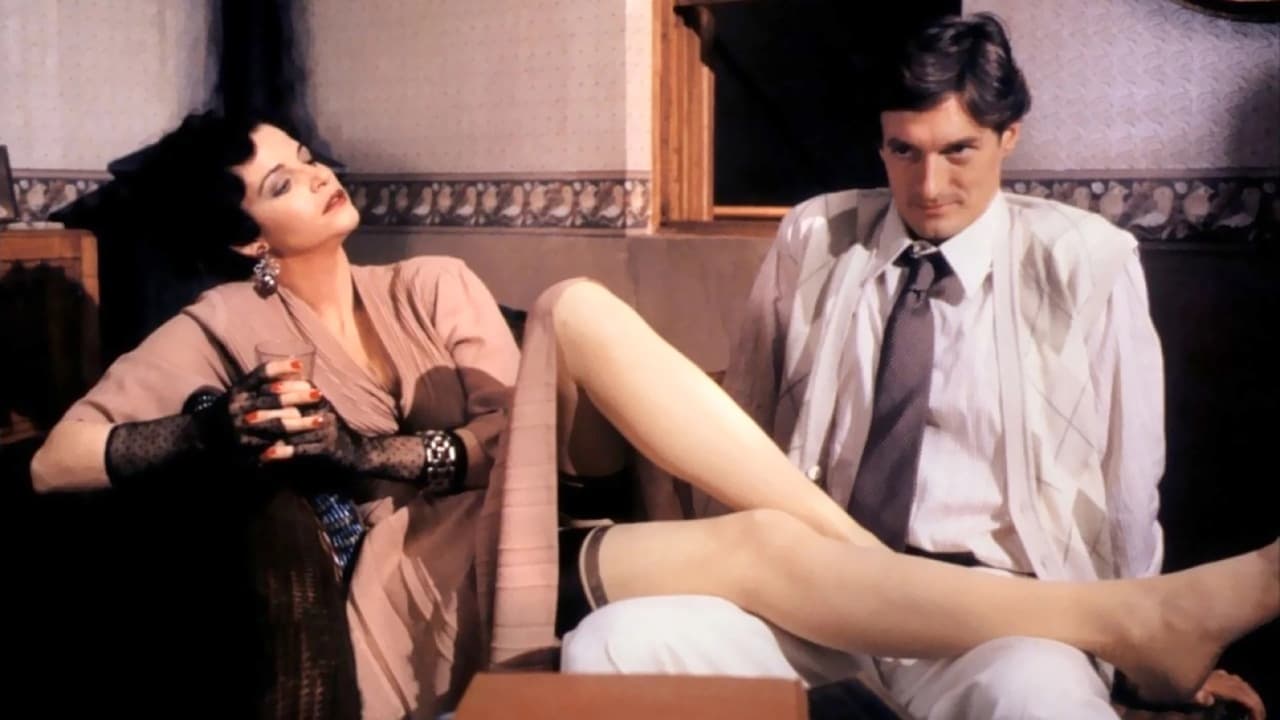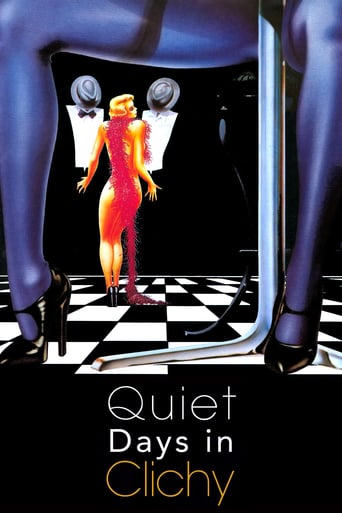

Reviewers have complained that this film does not capture enough of the book by Henry Miller and includes things he did not write. Of the additions, for me the frame story rings poignant and true. On the Californian coast we see the dying Miller obsessed by one last unconsummated passion for a beautiful young nude model, a recreation of the bewitching teenage Colette he had lost. Outside on the beach the ghosts of his old Parisian friends gather for him to join them. Then we move into his memories.Of these, the added stuff about fascism and communism in 1930s Paris does seem feeble. But my defence for both departures is that they are at worst ironic and at best comic. The real Miller and some of his friends may have taken themselves fairly seriously but in this film the cavortings and occasional soul-searchings of American exiles in Paris, immune from the harsh political facts of European life, border on the absurd. His devotion to Proust is treated satirically and to a Parisian his frequent comparisons with Brooklyn are merely ridiculous.In fact we see virtually no real Paris, the city being most of the time conveyed by sets, which deliberately distance the story to a dreamy insubstantial past. Like the artificiality of the book, the film creates a fantasy world, one of untrustworthy recollection from a gifted, persuasive but ultimately unreliable narrator. Though actuality does intrude when Colette runs away and jumps onto a very real Metro train, so leaving the imaginary sphere for the quotidian. While intensely autobiographical, incorporating wholesale people he knew at the time, Miller's work is fiction. It is not a diary but a melody spun out of his experience, looking beyond outward events to his inward poetic and philosophical reflections. This last dimension is what I miss in Chabrol's film, which mostly stays closer to the colourful surface occurrences of the characters' lives. Although I don't think many male viewers will complain about the often revealed surfaces of the many lovely women.
... View MoreThe American writer Joe (Andrew McCarthy) arrives in Paris to research and write about Proust. He meets the Polish Karl (Nigel Havers) and they become friends and costumers of brothels and restaurants. When the fifteen year-old Colette (Stéphanie Cotta) arrives in Paris, they both fall in love with her."Jours Tranquilles à Clichy" is a dull and pointless movie by Claude Chabrol based on the story of Henry Miller and Alfred Perlès. The movie is boring and absolutely different from the other works of this great French director. My vote is four.Title (Brazil): "Dias de Clichy" ("Days of Clichy")
... View MoreThis film is to be avoided by anyone wanting to see something worthwhile. If you are a Chabrol aficionado, well, you might just want to quench your thirst on completing your knowledge of his filmography. Chabrol totally misses the point of the novel. Although he interestingly casts the two main characters as somewhat resembling the original Jens Thorsen film main actors. Nothing of the situationist atmosphere of the book and the 1970s film is preserved. The plot is located in the 20ies/30ies with some nonsense political threads thrown in. The 70ies film apparently was reshaped to the 50ies/60ies (without much mention, but the street scenes would suggest so) - and that actually made more sense. Chabrol invents two threads of a night club and the dying Miller which just don't make it and turns the film into a tedious experience of wannabe cinematographic art. Having re-written the plot does not help anything in this flick - it finally just goes nowhere at all. Waste of money and waste of time. Take to the UK original version of Jens Thorsen in any case, even if this is VERY bleak and 70ies-ish. If I were Henry Miller, I would have shot Chabrol for this. Another thing I cannot understand is the rating. NOTHING in this film justifies and 16 or even 18-up rating. The French rated it at 12+ which is about what it deserves. *grumble*
... View MoreHenry Miller, the famous nefarious American writer in the twilight years remembers his youth spent in Paris at the dawn of the thirties. A life of debauchery guided by the search for rapture and intense pleasure of the senses through sex, food and literature (he was a profound admirer of Marcel Proust).Amid a bushy and patchy filmography, Claude Chabrol admits liking this movie very much. That this movie makes him feel good is a mystery to me for it showcases none interest. His lack of input in his film, even his absence in the directing are blatant. He shot in a glib way an amorphous biopic to which one doesn't succeed in getting interested beyond the first ten minutes. The characters (Henry "Joey" Miller, Alfred "Carl" Perlès, Colette Ducarouge) have little depth and thickness and their acting mainly consist in wandering from brothel to brothel, from restaurant to restaurant (as Chabrol's inclination for gastronomy has it) and from flat to apartment. Probably to obey to the famous Latin expression "Carpe Diem". The action is sluggish and it's nearly a feat that the filmmaker could stretch his film for two hours with such a thin, stale, repetitive screenplay. It's all the more infuriating as the scenario doesn't live up to some heaven-sent opportunities. The ones through which one could have remembered Chabrol's trademark like unearth the hateful flaws of a posh bourgeoisie. But alas, Chabrol contented himself to skim over this point. Bereft of this asset which might have justify the vision of this film and of rigor, Chabrol installs the audience in a deep torpor and one stays out of this derivative picture of the Paris during the Roaring Twenties.The cast is totally undistinguished, a far cry from Chabrol's great family like Jean-Claude Brialy, Michel Bouquet, Jean Poiret or Isabelle Huppert. Yes, the luminary Stéphane Audran is part of the cast but she's completely wasted in a role unworthy of her skills. Anna Galiena is also included in the cast but she will be given the chance to shine the same year with Patrice Leconte's dreamy "Mari De La Coiffeuse".Chabrol beat his dead horse with this mediocre commissioned film which is now in limbo. Anyway, 1990 was a dreadful vintage for him with these "quiet days in Clichy" and also with another fiasco the same year: "Dr. M".
... View More